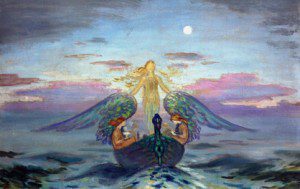 Arthur Koestler spoke of the Library Angel – that bookish spirit that makes texts appear at just the right time. I wish to speak now of a lesser, but highly active, spirit of stacks that we may call the Shelf Elf. His number is larger than the books available at your favorite bookshop, or even at amazon. He not only makes books turn up in unexpected ways; he can hide them or even make them disappear.
Arthur Koestler spoke of the Library Angel – that bookish spirit that makes texts appear at just the right time. I wish to speak now of a lesser, but highly active, spirit of stacks that we may call the Shelf Elf. His number is larger than the books available at your favorite bookshop, or even at amazon. He not only makes books turn up in unexpected ways; he can hide them or even make them disappear.
He is often at play in my preferred bookshops, which tend to be quirky independents and havens of twice-sold tales. One of these shelf-elf-haunted establishments is just down the street from my home, which is a mixed blessing because in the course of a year a significant portion of this bookshop’s stock migrates up the street into my house. When I step into another favorite, the Crow bookshop in Burlington, Vermont, I feel the quick fingers of the shelf elf assisted by quick beaks and talons, and hear the rustle of feathers when I turn pages.
He is frisky among my own groaning shelves, dropping books or concealing them at his whim. I have tried to cultivate civilized relations with him by giving him a little quality time first thing in the morning. I do this by opening a book at random and seeing what is in front of me on the page. This gives me a thought for the day. Often it gives me something more: the sense of a very palpable wink or raspberry from the shelf elf.
Certain books I use frequently for this exercise. Emerson’s Collected Essays is a favorite. But I am inconstant in my selections of books for bibliomancy, as is the shelf elf. Today I brought down The Civilization of the Goddess, the magnum opus of Marija Gimbutas, the great Lithuanian scholar of the Goddess cultures of Old Europe. When I opened it at random, I found myself looking at a diagram of a Megalithic tomb. The accompanying text read: “The beehive-shaped chamber (b) very likely symbolizes the rising power of Mother Earth in the shape of a mound or pregnant belly.”
This was a definite nod from the Shelf Elf. Why? On my to-do list today is to write up my travel notes on my encounters with the tradition of the Bee Goddess in Marija’s native Lithuania. The nod was made more vehement by the fact that there are only three other references to bees in the massive Civilization of the Goddess, and no reference to Austeja, the Lithuanian Bee Goddess in this particular volume.
Bibliomancy is the word for doing divination by the book, but the Shelf Elf wants me to specify that what I often do is more exactly termed stichomancy, which means divination by a line (or a verse of poetry). I am proud to be a stichler.

